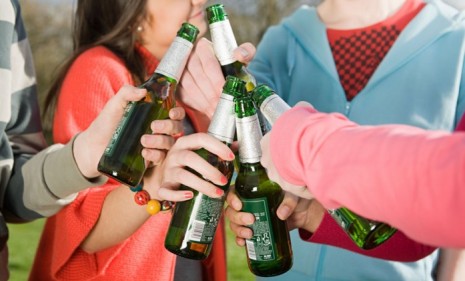Get drunk easily? Blame your parents
A low tolerance for alcohol could be part of your genetic makeup, say scientists

Do you feel lightheaded after just a glass or two of wine? Then maybe you have the "tipsy gene," a slice of your hereditary makeup that, according to a new study, makes you more sensitive to alcohol than most people. Here's a quick guide to the findings:
There is really a "tipsy gene"?
Yes, say researchers at the University of North Carolina, and it is shared by 10 percent to 20 percent of the population. The gene, known as CYP2E1, dictates how well a person can hold his or her liquor.
The Week
Escape your echo chamber. Get the facts behind the news, plus analysis from multiple perspectives.

Sign up for The Week's Free Newsletters
From our morning news briefing to a weekly Good News Newsletter, get the best of The Week delivered directly to your inbox.
From our morning news briefing to a weekly Good News Newsletter, get the best of The Week delivered directly to your inbox.
How does it do that?
Alcohol is mostly broken down by the liver, but some metabolizes in the brain — which is why we get drunk. CYP2E1 carries instructions for the enzyme that breaks down alcohol in the brain, telling it to work faster. That makes people feel drunk faster.
How did scientists discover it?
Researchers tested 200 pairs of siblings with one alcohol-dependent parent, but no drinking problems themselves. They asked each pair to drink a mixture of grain alcohol and soda, and asked them how it affected their sobriety. After gene testing, the scientists determined that those with the CYP2E1 gene got drunk faster.
A free daily email with the biggest news stories of the day – and the best features from TheWeek.com
Did the news come as a surprise?
Not completely. This is the first scientific evidence that our tolerance for alcohol could be inherited, but it has been strongly suspected that genetics play a role in how people handle alcohol. Research suggests that having an alcoholic parent quadruples a person's risk of becoming an alcoholic, although both genes and the environment are probably to blame, says professor Colin Drummond of the London Institute of Psychiatry. "It is well recognized that alcohol dependence runs in families," he told the BBC.
What use is this finding?
Scientists hope it can be used to "protect" against alcoholism. Those who react strongly to alcohol are less likely to become addicted, so it might be possible to give people CYP2E1-like drugs to make them more sensitive to alcohol — and less likely to enjoy it — or to help sober people up. "Think of all the Lindsay Lohans, Snookis, and David Hasslehoffs — along with the myriad court dates and wasted tax dollars — we could potentially save," says Keosha Johnson at WBUR's Common Health blog.
Sources: AOL News, Daily Mail, BBC News, About.com, WBUR
-
 Is the US about to lose its measles elimination status?
Is the US about to lose its measles elimination status?Today's Big Question Cases are skyrocketing
-
 ‘No one is exempt from responsibility, and especially not elite sport circuits’
‘No one is exempt from responsibility, and especially not elite sport circuits’Instant Opinion Opinion, comment and editorials of the day
-
 Businesses are caught in the middle of ICE activities
Businesses are caught in the middle of ICE activitiesIn the Spotlight Many companies are being forced to choose a side in the ICE debate